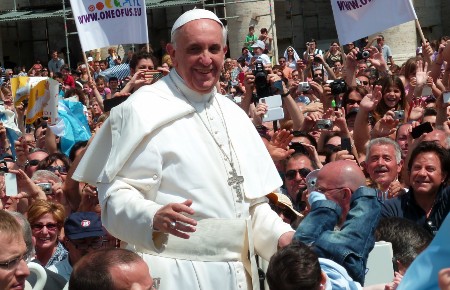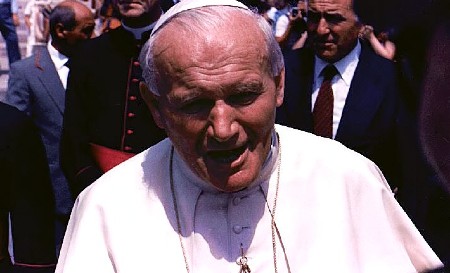 Hi readers, it seems you use Catholic Online a lot; that's great! It's a little awkward to ask, but we need your help. If you have already donated, we sincerely thank you. We're not salespeople, but we depend on donations averaging $14.76 and fewer than 1% of readers give. If you donate just $5.00, the price of your coffee, Catholic Online School could keep thriving. Thank you. Help Now >
Hi readers, it seems you use Catholic Online a lot; that's great! It's a little awkward to ask, but we need your help. If you have already donated, we sincerely thank you. We're not salespeople, but we depend on donations averaging $14.76 and fewer than 1% of readers give. If you donate just $5.00, the price of your coffee, Catholic Online School could keep thriving. Thank you. Help Now >
Deal Hudson: A Hill Worth Dying On
FREE Catholic Classes
Like that of Socrates, St. Thomas More's dilemma is easily translated to the challenges facing Catholics who enter politics in the 21st century. For 50 years, Catholic politicians have been required to make a choice between life and death; first the abortion issue, then the abortifacient contraception issue, and soon it will be euthanasia. Voting records tell the tale of who chose life and, in doing so, chose to risk losing elections rather than putting principle aside (usually to some deep, dark hole in their private conscience). Those Catholics in politics who ask whether "this is a hill worth dying on" are usually reluctant to die on any hill, much less recognize the moral high ground in the first place. When "electability" trumps all other considerations, defeat on election day doesn't leave the candidate lying on a hill representing the principles she fought for. No, she is simply forgotten, because there is nothing left to remember. Those who compromise and lose leave no legacy, no inspiration, their loss has no afterlife of gain.
 Hi readers, it seems you use Catholic Online a lot; that's great! It's a little awkward to ask, but we need your help. If you have already donated, we sincerely thank you. We're not salespeople, but we depend on donations averaging $14.76 and fewer than 1% of readers give. If you donate just $5.00, the price of your coffee, Catholic Online School could keep thriving. Thank you. Help Now >
Hi readers, it seems you use Catholic Online a lot; that's great! It's a little awkward to ask, but we need your help. If you have already donated, we sincerely thank you. We're not salespeople, but we depend on donations averaging $14.76 and fewer than 1% of readers give. If you donate just $5.00, the price of your coffee, Catholic Online School could keep thriving. Thank you. Help Now >
Highlights
Catholic Online (https://www.catholic.org)
2/18/2014 (1 decade ago)
Published in U.S.
Keywords: Crisis Magazine, Barbara Comstock, faithful citizenship, abortion, contraception, moral coherence, conservatism, National Review, Ramesh Ponnuru, sophistry, catholics and politics, Deal W. Hudson
WASHINGTON,DC (Catholic Online) - The recent debate over the inconsistencies in Barbara Comstock's pro-life record has gotten me thinking about the old adage, "Is this hill worth dying on?" Its origins are military, but its usage is most often political, as when candidates are forced to decide what principles are worth holding onto even if losing the election is the result.
The question is venerable and ancient: Socrates in Plato's Apology faced a choice of accepting a death sentence for a crime he did not commit or accepting an easy escape from his Athenian jail to an adjacent city state. To his friends pleading for him to escape, Socrates explained, "But I suggest, gentlemen, that the difficultly is not so much to escape death; the real difficulty is to escape from doing wrong."
"Escape from doing wrong." The phrase suggests life itself is a trial where each day we face the temptation to forget moral principles for the sake of utility, whether to succeed or to win, in short, to avoid suffering from the consequences of seeking what is good in the face of danger. Those who reliably do what is good in spite of the consequences are called, in classical terms, the courageous. Those who abandon principles when they become inconvenient or costly are called the opposite, cowardly.
Socrates chose the ultimate consequence, his own death, in order to exemplify what he had taught his entire life, that a virtuous life was more important than any worldly wealth, honor, or plaudit.
In his classic book, The Death of Socrates (1947), Catholic philosopher Romano Guardini points out the many parallels between the example of Socrates and Jesus Christ who also could have chosen to escape from a death he did not deserve. Guardini, writing with the wisdom of the Patristic Father, observes the "ultimate, almost absolute meaning" of Socrates' choice, representing a "deep piety that comprehends its own existence on the basis of God's word."
In other words, the life of Socrates exemplifies one that treated a moral absolute as a "hill worth dying on." In the time of Socrates, those who scorned putting principles first were called "sophists," those who had only the appearance of wisdom. The sophistry of the Sophists, however, did not die with Socrates but has persisted under various guises throughout human history.
Many readers will recall the scene from A Man for all Seasons when St. Thomas More says to his son in law, Richard Rich:
"and when the last law was down, and the Devil turned around on you--where would you hide, Roper, the laws all being flat? This country's planted thick with laws from coast to coast--man's laws, not God's--and if you cut them down...d'you really think you could stand upright in the winds that would blow then? Yes, I'd give the Devil benefit of law, for my own safety's sake."
It attests to the power of modern cinema that the essence of Plato's Apology could be captured and embedded in millions of minds without anyone having to read a page, whether in English or Ancient Greek. Indeed, when students are asked to meditate through film on the moral corruption incited by political ambition or simply pure greed, it's this film that is chosen.
Both Socrates and More chose a "hill to die on" and "escape from doing wrong" rather than escape death. Both were heroic choices, which left their friends baffled and their enemies elated, but at the distance of history we see their "loss" as a "gain" for all of us. What we gain is this: Heroic choices, though they look impractical and foolish, when made plant a seed of human hope for the future. The human person will never be so crushed and disillusioned that they recognize no more hills "worth dying on."
Like that of Socrates, St. Thomas More's dilemma is easily translated to the challenges facing Catholics who enter politics in the 21st century. For 50 years, Catholic politicians have been required to make a choice between life and death; first the abortion issue, then the abortifacient contraception issue, and soon it will be euthanasia. Voting records tell the tale of who chose life and, in doing so, chose to risk losing elections rather than putting principle aside (usually to some deep, dark hole in their private conscience).
Those Catholics in politics who ask whether "this is a hill worth dying on" are usually reluctant to die on any hill, much less recognize the moral high ground in the first place. When "electability" trumps all other considerations, defeat on election day doesn't leave the candidate lying on a hill representing the principles she fought for. No, she is simply forgotten, because there is nothing left to remember. Those who compromise and lose leave no legacy, no inspiration, their loss has no afterlife of gain.
© Deal W. Hudson, Ph.D
-----
Deal W. Hudson is president of the Morley Institute of Church and Culture, Senior Editor and Movie Critic at Catholic Online, and former publisher and editor of Crisis Magazine.This column and subsequent contributions are an excerpt from a forthcoming book. Dr. Hudson's new radio show, Church and Culture, will begin broadcasting in February on the Ave Maria Radio Network.
---
'Help Give every Student and Teacher FREE resources for a world-class Moral Catholic Education'
Copyright 2021 - Distributed by Catholic Online










 Daily Readings for Friday, April 26, 2024
Daily Readings for Friday, April 26, 2024 St. Cletus: Saint of the Day for Friday, April 26, 2024
St. Cletus: Saint of the Day for Friday, April 26, 2024 Prayer before the Closing of the Day: Prayer of the Day for Friday, April 26, 2024
Prayer before the Closing of the Day: Prayer of the Day for Friday, April 26, 2024


